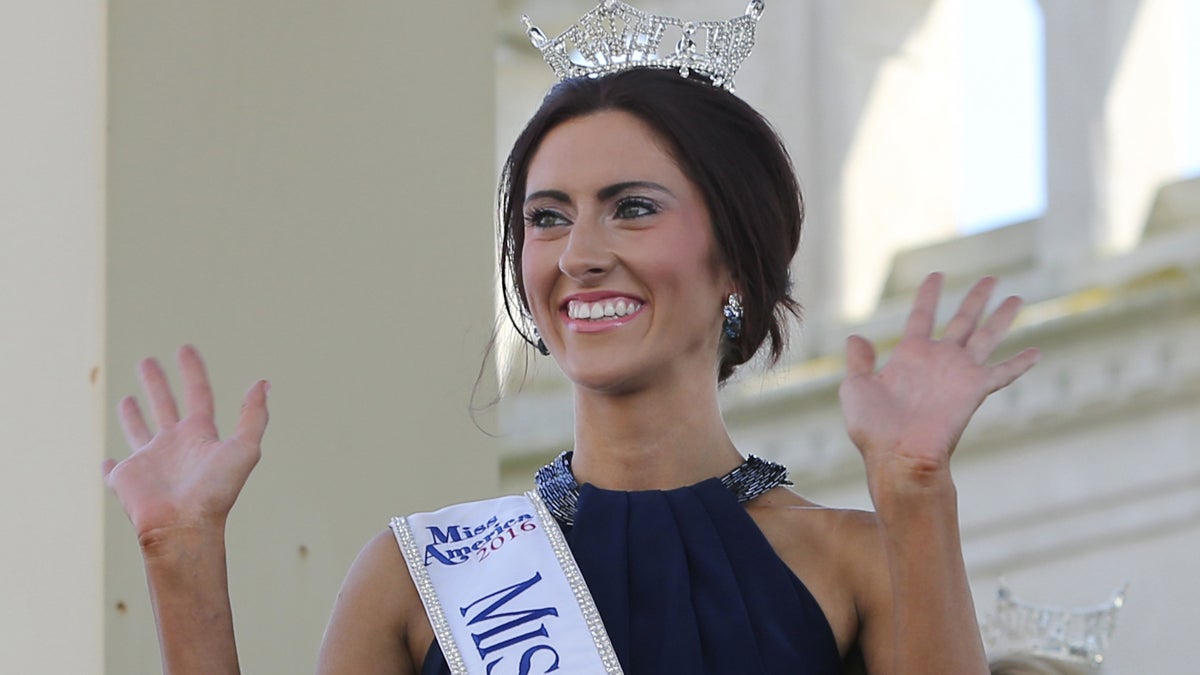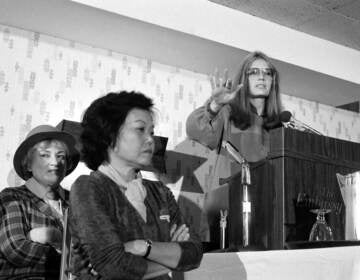Phyllis Schlafly, Miss Missouri, and the burkini: A feminist tilts her head
Phyllis Schlafly died. A Miss America contestant came out. And burkinis continue to fire up the French. Is your feminist bell clanging yet? It should be.

Miss Missouri
Between the she-said/he-lied electoral bombast of the past week, a few other interesting things happened: Phyllis Schlafly died. A Miss America contestant came out. And burkinis continue to fire up the French.
Is your feminist bell clanging yet? It should be. Because each of these events stirs up questions at the core of what used to be called (back in the day when Schlafly barnstormed the country opposing it) women’s “liberation.”
A little history: What exactly was it women yearned to be liberated from? Well, starting with the 1792 publication of “A Vindication of the Rights of Woman,” by Mary Wollstonecraft, women wanted to be uncuffed from laws and customs that thwarted their economic, political, and personal selfhood.
They wanted to attend law schools and medical schools; they wanted to sign contracts and own property; they wanted the preacher to excise the word “obey” from their marriage vows.
They wanted, goddammit, to vote.
And piece by piece, protest by protest, backlash upon backlash, women gained those rights. By 1972, when I was an impressionable 10-year-old perusing the first copy of Ms. magazine, there was even legislation that would have enshrined women’s equality in the Constitution. The Equal Rights Amendment said simply that equality under the law “shall not be denied or abridged … on account of sex.”
Enter Phyllis Schlafly, stage far-right. No, she wasn’t the orange-juice lady (that was Anita Bryant, who spouted homophobia with a citrusy smile). Schlafly was the Ivy League-educated lawyer who opposed the ERA on grounds that it was anti-family and anti-American. She was a living, fire-breathing contradiction: a passionate career woman cruising the United States in order to crush legislation that would have opened doors for other women.
Later, Schlafly’s son was outed (how’s that for karma?), but the political damage was done. The ERA came up three states short of ratification, and feminists kept rattling the gates (albeit in those 1980s skirt suits with the floppy ties).
Meantime, entering from the fringed left: Stonewall-era lesbian and gay activists, drag queens and diesel dykes among them, who pushed the civil-rights agenda for even broader inclusion. By the time I came out in 1986, my friends and I exulted every time a politician, celebrity, or athlete joined the ranks of being an “acknowledged homosexual.”
We applauded the first lesbian kiss on prime-time TV, grew teary-eyed at Ellen’s coming-out episode, and saluted the courage of we-are-everywhere pioneers like Billie Jean King and Army Colonel Margarethe Cammermeyer.
Pretty soon, LGBT people were coming out all over: at the Olympics, in Hollywood, in the halls of Congress. The news barely makes headlines anymore — which is probably why my first reaction to out-and-proud Miss Missouri was something like “ho-hum.”
But my second reaction was murkier. I wondered if an openly lesbian Miss America (the key word is “openly”; I’m sure there have been numerous closeted Miss A’s who went home, doffed their tiaras and got congratulatory smooches from their girlfriends) is really a mark of progress — or an indication of just how irrelevant the pageant has become.
These days, with elementary schools designating “be yourself” zones and newspapers accepting “their” as a singular pronoun for the gender-fluid, it’s not even avant-garde to suggest that gender is always a performance. Doesn’t it seem absurd, then, to award scholarships to women based even in part on their ability to perform a traditional female role (smiling, responding, receiving) in stereotypical feminine garb (evening gowns, bathing suits, heels)?
Here’s a good gauge to determine if something is sexist: Sub the other gender into the scenario and see if it comes up crazy. Right. A parade of twenty-something men, all chiseled jaw lines and sculpted abs, wearing sashes over their best Speedos, and vying for the $50,000 scholarship that will help them “make the world a better place.”
And that brings us to the burkini, a garment that allows Muslim (or Orthodox Jewish) women to enjoy beach excursions and salt-water swims without compromising their modesty. Some French towns, though, have issued a stern non with burkini bans that enact Islamophobia on the battleground of women’s bodies. It’s more than a little ironic that, on the same sands where one woman can sunbathe topless, another can be arrested for covering up. If liberation means anything, surely it means the freedom to dress as one wishes on a public beach — whether those long sleeves and high collars are meant to prevent melanoma, thwart comments about one’s cleavage or fulfill God’s call.
In a poem by Naomi Shihab Nye about the insanity of war, one line reads, “If you tilt your head just slightly/it’s ridiculous.” This trifecta of recent events gave me just that jolt of perspective.
It’s ridiculous that, in 2016, the U.S. Constitution does not have a provision guaranteeing equal protection on account of gender (however it is expressed).
It’s ludicrous that we award education dollars to women (no matter whom they kiss) based on how well they can strut in stilettos and a swimsuit.
It’s outrageous that a French police officer can stand on a beach in full uniform and cite a woman because her bathing outfit covers her elbows.
Mostly, it boggles the mind that women’s bodies, clothing, marital status and reproductive choices are still a matter of vociferous public debate.
Try this at home, folks: Spend 24 hours listening with an ear tuned to gender. Notice how many comments call attention to a woman’s weight, hair, make-up (or lack thereof), clothing (too frumpy? too slutty?) or sexuality.
Notice how many of them come from your own mouth.
Now do better. Start with yours truly, if you’re a self-identified woman — then your sisters, your colleagues, your daughters. Especially your daughters.
It goes like this: You are driving two 10th-grade girls to their first day of school, and they are chattering — nervously, excitedly — about advisors and lunch periods, booty shorts and hair-lightening. They are strong, funny, self-possessed young women who run cross-country and make art and write papers analyzing social commentary in the novels of Kazuo Ishiguro.
As they get out of the car, you are tempted to say, “You look great!” But you stop yourself. You apply the gauge: Would you say it to your son? If you tilt your head just slightly, it’s ridiculous.
“You look … confident,” you tell the girls, and you hope they hear you before the door slams shut.
WHYY is your source for fact-based, in-depth journalism and information. As a nonprofit organization, we rely on financial support from readers like you. Please give today.


